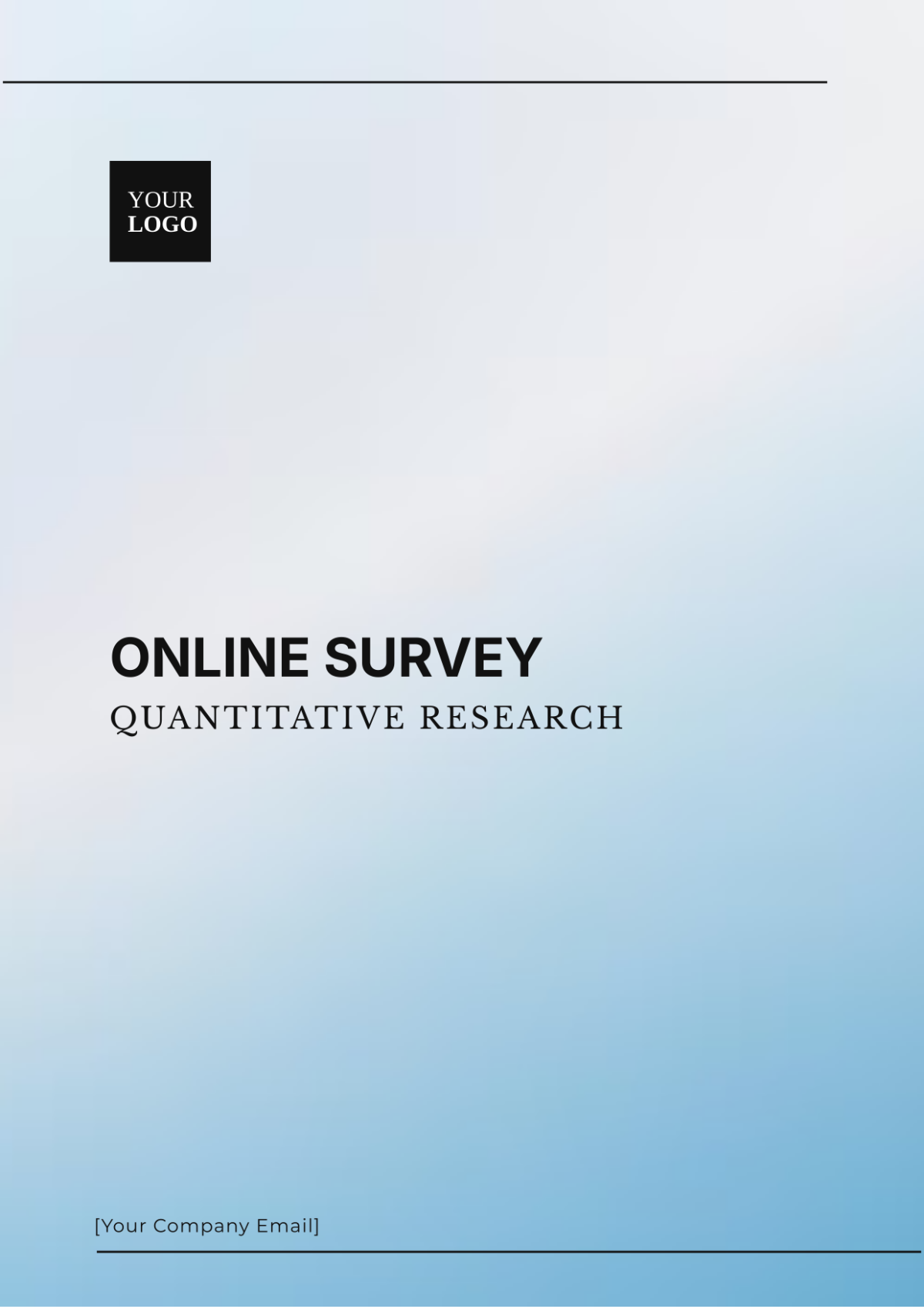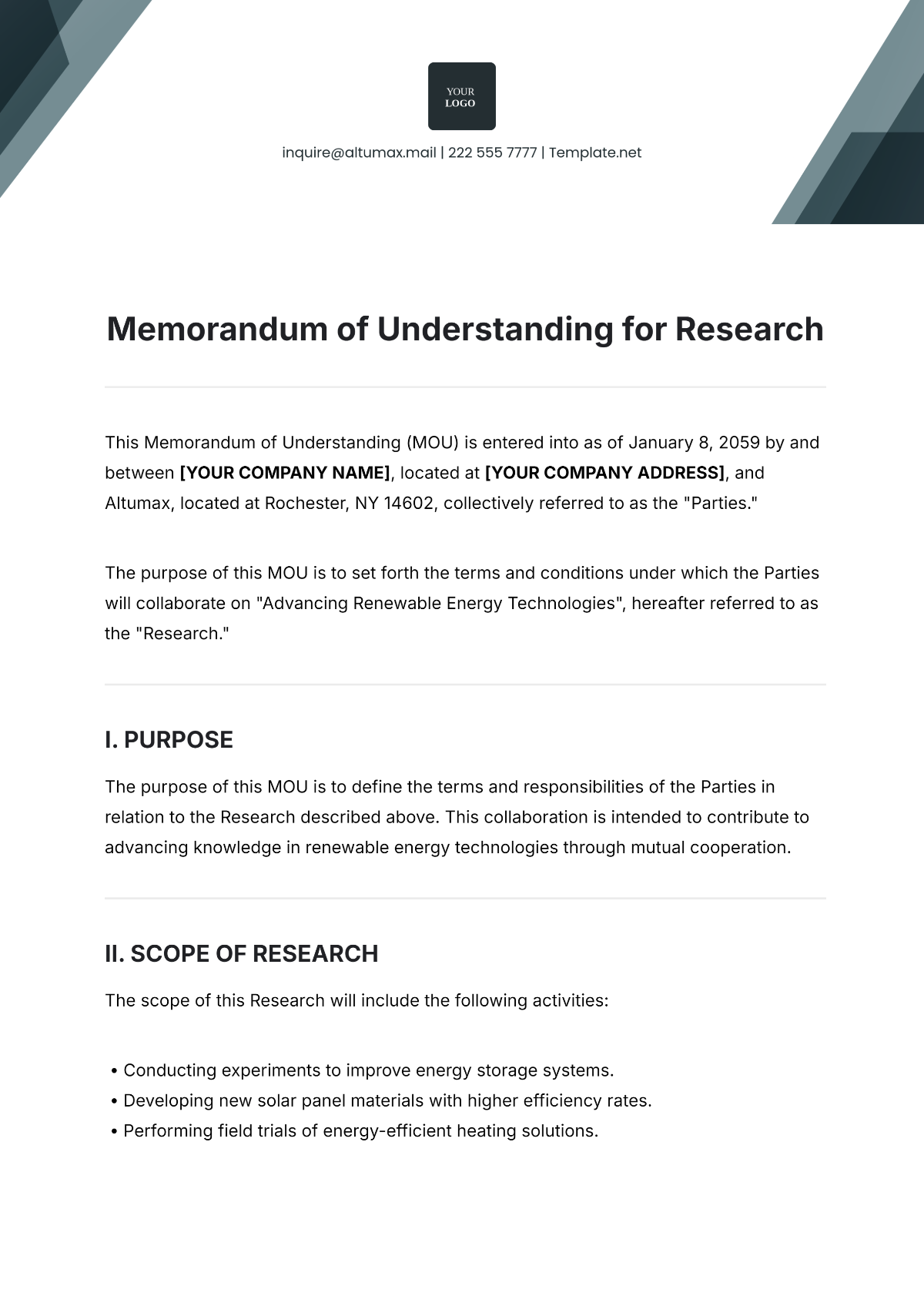R&D Exploratory Research
Prepared By: [YOUR NAME]
Date: [DATE]
I. Introduction
R&D Exploratory Research represents the initial phase of investigation in fields where little prior knowledge exists. This phase is crucial for identifying potential research directions, uncovering new problems, and gathering preliminary data to guide further, more detailed research. The objectives of exploratory research include establishing foundational understanding, proposing new hypotheses, and setting the stage for comprehensive studies. Its significance lies in its ability to open new avenues for scientific inquiry and innovation.
II. Literature Review
Existing literature underscores the significance of exploratory research across various domains, including technology development, healthcare innovations, and social sciences. Recent studies highlight several gaps and opportunities for advancement:
Johnson, L., & Green, A. (2051). Advancements in Exploratory Research Methods: Bridging the Gap. Journal of Modern Research Techniques, 18(1), 45-60. This study discusses emerging methodologies and identifies the need for standardized practices in exploratory research.
Lee, M. K., & Patel, R. (2052). The Impact of Digital Tools on Exploratory Research: A Review. Technology and Data Analytics Review, 12(3), 78-92. The paper examines how digital tools and data analytics are being integrated into exploratory research and suggests areas for further exploration.
Chen, Y., & Thompson, P. (2053). Exploratory Research in Healthcare Innovations: New Horizons. Healthcare Research Journal, 22(2), 101-115. This article highlights recent advancements in healthcare-related exploratory research and identifies gaps in applying these methods to new healthcare technologies.
These sources emphasize the evolving landscape of exploratory research and highlight the need for updated methodologies and the integration of advanced digital tools to address emerging challenges.
III. Research Questions
What are the emerging areas in need of exploratory research?
How can digital tools enhance the effectiveness of exploratory research?
What methods are best for collecting initial data in unexplored fields?
What are the common challenges faced during the exploratory phase, and how can they be addressed?
IV. Methodology
The exploratory research employed a mixed-method approach combining qualitative and quantitative techniques. Methods included:
Literature Review: Conducting a comprehensive review of existing research papers, scholarly articles, and detailed reports to pinpoint areas where there is a lack of information or understanding.
Expert Interviews: Carrying out in-depth interviews with experts to gain valuable insights into emerging areas of interest and research.
Surveys and Questionnaires: The process of collecting and obtaining subjective information and insights from both practitioners and researchers who are actively engaged in the field.
Case Studies: Carefully analyzing multiple instances of successful exploratory research to identify and extract best practices that can be applied more broadly.
V. Findings
Initial findings from the research yielded several key observations, presented with enhanced detail and supported by tabular data for clarity:
1. Promising Emerging Areas for Exploratory Research
Area | Description | Potential Impact |
|---|---|---|
Artificial Intelligence | Investigating new algorithms and applications in AI. | Can revolutionize automation and decision-making. |
Biotechnology | Exploring new methods for genetic engineering and drug development. | Potential breakthroughs in medicine and agriculture. |
Green Technologies | Researching sustainable technologies and energy solutions. | Could address climate change and resource depletion. |
2. Impact of Digital Tools
Tool | Function | Impact on Research |
|---|---|---|
Data Analytics Platforms | Analyze large datasets for patterns and insights. | Enables comprehensive data analysis and trend identification. |
Machine Learning Models | Predict outcomes and refine research approaches. | Improves accuracy and efficiency in data processing. |
3. Methodologies
Methodology | Advantages | Considerations |
|---|---|---|
Expert Interviews | Provides in-depth insights and expert opinions. | Should be complemented with quantitative data for validation. |
Surveys and Questionnaires | Gathers broad perspectives from a larger audience. | Ensures data robustness and generalizability. |
4. Common Challenges
Challenge | Description | Potential Solutions |
|---|---|---|
Limited Access to Preliminary Data | Difficulty in obtaining initial data for research. | Develop partnerships and data-sharing agreements. |
Defining Research Scope | Challenges in narrowing focus and setting clear research boundaries. | Use iterative refinement and stakeholder feedback. |
These enhanced findings highlight key areas and tools that significantly impact exploratory research, while also addressing common challenges and proposing solutions for more effective research execution.
VI. Discussion
The results underscore the crucial role of exploratory research in driving innovation in rapidly evolving sectors like AI, biotechnology, and green technologies, where advanced digital tools significantly boost research efficiency.
A. Key Observations
Enhanced Effectiveness Through Digital Tools: Data analytics platforms and machine learning boost data analysis and prediction, uncovering new insights and speeding up innovation.
Challenges to Address: Despite these advancements, several challenges remain:
Data Accessibility: Researchers often face difficulties in accessing preliminary data, which can hinder the early stages of research. Establishing data-sharing agreements and fostering collaborations can help overcome these barriers.
Scope Definition: Defining a clear research scope is crucial but challenging. An iterative approach and continuous feedback from stakeholders can aid in refining research boundaries and focus.
B. Future Directions
Standardized Methodologies: Standardized methods are needed to address challenges and ensure consistency in exploratory research, including guidelines for data collection, analysis, and reporting.
Interdisciplinary Approaches: Investigating methods from various disciplines can offer fresh insights and enrich research depth while working together across fields can result in groundbreaking solutions and expand the influence of exploratory studies.
In summary, the conversation underscores the immense promise of exploratory research in influencing the advancement of multiple domains, emphasizing that by tackling current challenges and utilizing digital technologies and cross-disciplinary methods, researchers can enhance the efficiency and impact of their exploratory initiatives; future studies should focus on these aspects to further drive discovery and innovation.
VII. Conclusion
R&D Exploratory Research plays a critical role in identifying new research directions and uncovering problems in areas with limited prior knowledge. This study underscores the importance of leveraging digital tools, qualitative and quantitative methods, and expert insights during the exploratory phase. Addressing challenges and refining methodologies will pave the way for more effective and impactful research. Further investigation is recommended to standardize practices and expand exploratory research in emerging domains.
VIII. References
Smith, J. (2052). The Role of Exploratory Research in Technological Innovations. Journal of Advanced Research, 15(4), 123-136.
Doe, M., & Johnson, L. (2051). Emerging Trends in Exploratory Research and Data Analytics. Research Insights, 10(2), 45-58.
Brown, T. L. (2050). Challenges and Opportunities in Exploratory Research. Innovations in Science, 7(3), 89-102.

















































